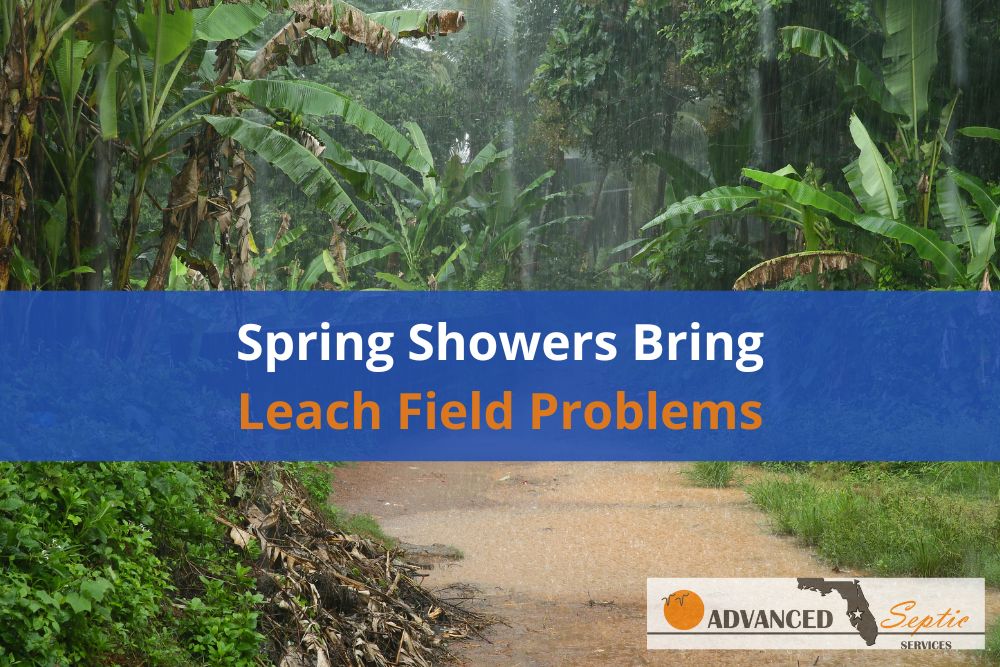
While it sometimes feels like every season is rainy season in Florida, during the Spring, Central Floridians can expect the afternoon rainstorms to start ramping up (with their peak being in the Summer months). These brief occurrences of rainfall may only last 20-30 minutes but they can cause a leach field problems from over saturation. This makes it difficult for wastewater to drain from a septic system, causing backups and in extreme cases, system failure.
Understanding how to prevent leach field flooding is key to withstanding the drizzly springtime. Keeping a close eye on your leach field during the spring can prolong the life of your entire septic system and save you from future repairs due to erosion.
The Effect of Spring Showers On Your Leach Field
The amount of rainfall varies throughout the state of Florida, with the northern region averaging around 3-4 inches per month during the springtime. Central and South Florida experience slightly less, with 2-3 inches on average. These spring weather patterns can result in soggy soil, which makes a leach field less efficient at processing wastewater. Porous soil acts as a natural filter, removing contaminants and pollutants from the water before being released into nearby waterways.
Once the soil has become waterlogged, it’s difficult for the wastewater to absorb into the soil. This can result in slow drainage and sewer backups within the home. During the spring, homeowners may notice erosion of the soil surrounding the field due to rainfall. This can damage the underground network of pipes and typically requires immediate repair.
Common Leach Field Issues During the Springtime
Depending on the frequency of spring showers, homeowners may encounter the following leach field issues:
- Waterlogged soil
- Erosion of soil
- Slow drainage
- Sewage backups
- Overgrown roots
To help a saturated and overworked leach field, homeowners will need to redirect surface water from the field to prevent it from becoming further overwhelmed by rainwater.
During the springtime, many homeowners take on outdoor projects such as planting gardens and landscaping. This increase in water usage can overload a septic system and cause the leach field to work harder to compensate for the extra water. Avoid putting plants near the leach field that require large amounts of water to survive to reduce the amount of watering happening in that area. When landscaping, avoid placing deep-rooted plants near the field, as they can become overgrown and cause pipe damage.
Any foul smells coming from a leach field are cause for concern. No strong odor should be present if things are running smoothly. A qualified professional should be called if the aforementioned issues are noticed, as the leach field may require an inspection.
Tips for Leach Field Maintenance During the Spring
Leach fields are integral parts of a healthy septic system. They are necessary for proper wastewater treatment, as well as environmental protection against harmful bacteria. As springtime approaches, consider pumping your tank if it’s overdue. This will allow the system to take on more water before the leach field becomes oversaturated.
During times of heavy rainfall, it’s important to limit water usage within the home. This prevents the leach field from taking on excess water. If the forecast predicts heavy rain and thunderstorms, avoid running appliances such as a dishwasher or washing machine — as these can contribute a significant amount of water to the system.
In anticipation of spring showers, point gutters away from your leach field. This prevents rainwater from being directed to the field and allows the leach field to process wastewater instead of fresh water.
Experiencing Spring Showers? Call Us Today!
Spring rain showers can lead to soggy soil, which spells trouble for a leach field. If you’ve noticed any signs of erosion or poor drainage, call the professionals at Advanced Septic Services. Ignoring problems with your leach field can lead to bigger issues with your septic system.

